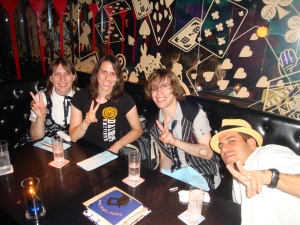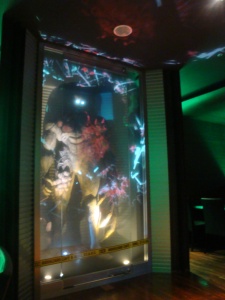When I first arrived in Japan, I was told that being genki is a sign of a good teacher. Having no clue what that entailed, I asked an English teacher at an International Association Festival and he rolled his eyes and said, “It means they want the happy foreigner to always be happy.” His face showed anything but enthusiasm at the thought.
Nowadays, I can usually tell if a foreigner has lived in Japan for over a while if I say the word “genki” and their face gets this constipated look of suppressed disgust. The American man I met all those months ago was the first person to show me that face. The thing is, “genki” does not just mean “energy, happiness, full of life.” Genki is also a way of life.
The American man went on to explain that in Japan it’s considered good manners to be genki. Worrying other people about your problems is seen as kind of a selfish thing to do. Instead, one should always think of others. Therefore, stay genki and smiling and happy looking so that you appear fine. If you’re in real danger, of course, seek help. However, if you’re tired or feeling burned out, you’re not supposed to show it.
In a vain attempt to try and explain the genki lifestyle, it’s kind of like pretending you’re happy when you’re not. If you’re having a bad day, don’t let people see it, especially at work. Most people in America who are over the age of twenty one and have held a job might say, “Oh, well that’s just being professional. The whole world doesn’t have to know you’re having a bad day. Just do your job and go home.” Well, alright, but here’s the thing. Imagine it’s not just for the boss. Imagine having to wear your masking smile that’s for your boss around all the co-workers, staff, your acquaintances, anybody who makes you angry ever, and possibly even your own good friends. This is an oversimplification, and I apologize that I can’t think of a good way to explain it better.
Some foreigners have issues with the genki lifestyle. For me, it’s hard to do something that kind of feels like lying all the time. I have been taught since I was a kid that it’s not only a good thing to express your emotions but that it’s also honesty. I know that logically I wouldn’t tell the whole world my business, but at the same time if I’m not feeling so good I don’t have to smile and laugh.
I got a small lecture from one of my JTEs when I was suffering from an illness one month. She essentially said that people were worried and maybe I should try to “not worry them.” I wanted to yell, “Well excuse me for being sick!” But I shoved down that anger and just kept listening. I learned that the teachers and the students were upset that I wasn’t happy. They were thinking the worst case scenarios, and so that’s why she was asking for me to try being genki.
The problem is I’m not really a genki person. I’m just not built that way. I’m made to chill. Chill people don’t smile and talk and be all energized when there’s nothing to smile or talk or be energized about, you know? Still, I decided that since I’m in Japan, I might as well give it a try. Maybe there was some hidden genki in me I just didn’t know about yet?
Also, I didn’t want to worry anybody, so I did it. I made myself genki for the students and tried my best to be genki around teachers. It was exhausting, but for the rest of that month, I pretended my life was full of sunshine and daises. When I moved over to the other school, I tried on this genki thing and found myself breaking a little bit under the strain.
The thing is I have also gotten advice from other more experienced ALTs and English teachers to be careful about genki. I remember the American man in particular warned me, “They will try their best to make you as un-American as possible. Don’t let them do that. The genki thing is Japanese culture. Stay true to your American self.” At the time I thought he was just paranoid and full of bitterness, but now that I got into that situation, I could start to see his point.
After about a month into The Genki Experiment, I was in class and walking around students’ desks. I was smiling, but inside I was cursing up a storm. About five or six students didn’t bring their notebooks to class, and when I tried to ask about why, they just waved their hands and said, “Eigo wakaranai (I don’t understand English).” The notebook thing didn’t really get to me. Instead, it was the blatant rudeness that just made me kind of pissed. I tried to tell myself that it wasn’t a big deal, that really I’m lucky to have students that weren’t rebellious and mean monsters like I’d heard about at other schools.
But the genki got to me. I stomped up to the front of the class, replaced my smile with a deep frown, placed myself in front of the board with my arms crossed and possibly fire shooting out of my eyes. My JTE looked at me funny since I’d never done something like this before. I said with a very calm voice, “Six students do not have their notebooks today.” Slowly, I informed them, “I am very disappointed.” My JTE gasped dramatically and translated for me.
After class, I fully expected to get another lecture. I was not genki. I was the opposite of genki. I was a dragon lady for a moment there. I braced myself as my JTE came over to talk to me.
To my amazement, she said, “Thank you so much! I think students needed to hear that.”
Say wha-?
Turns out that my non-genki self was just the thing she needed from me. I felt kind of thrown off kilter at that point.
I decided to try and figure out what exactly I was going to do about this genki business. Did I really want to put on a mask every single day? What was the line between professionalism and genki? Where did the responsibility to myself end and the responsibilities to others start? I did not like looking at the murky grey areas of multicultural living and wondering what made me American or Japanese.
In the end, I made my decision over coffee. I was in the teachers’ break area when a teacher came up to me with a small smile and asked me, “Genki desu ka (How are you)?” I looked at him for a moment before replying with a small smile, “Genki desu (I’m fine), but I’m tired and busy.”
“Oh!” He smiled back, “Me too!” And then we spent about ten minutes bitching about everything we had to get done before the end of the day.
I finally just came to the decision that genki wasn’t really for me. At the same time, I was going to do my own version of genki for my students. Basically, it involves appearing energized and getting all fired up for them. Yet, in the teachers’ room, I would be work with an expression that conveyed how I felt, and if they were worried, well they’d just have to deal. I think most people are actually happy to see me back to the older model. I think I was freaking out a couple of the other teachers who knew me better, anyway.
I’m not going to bash the genki lifestyle, though. If anything, I admire anyone with the ability to do it. I cannot muster enough energy to keep something like that up all the time. To the people who can not only do that but also make it an art art form, I tip my hat to you. It’s simply a cultural difference, and I accept that it’s one I simply can’t assimilate into my identity. To each their own.
It’s all good 🙂






